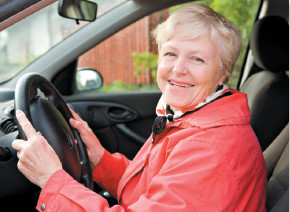Stay behind the wheel longer
|
Driving assessment programs evaluate your driving history, family concerns, overall health, thinking, and driving reflexes. They can help you brush up on skills and get up to speed on new driving laws. Image: Thinkstock |
A driving assessment program can help identify your strengths and weaknesses and suggest ways to improve your driving skills.
The sense of freedom and independence that comes with driving is as important at 65 as it is at 16. But driving skills may start to falter as we age, an issue many people choose to ignore. "We all seem to be in denial about driving in our older years. No one wants to give it up. The good news is that you may not have to," says Lissa Kapust, a social worker at Harvard-affiliated Beth Israel Deaconess Medical Center.
How we change
Aging may affect vision, hearing, coordination, thinking, visuospatial skills, or reaction time, any of which can have a direct impact on driving. For example, you may not be able to see a stop sign if you have vision problems, and you may not be able to figure out how far it is to a red light if you have trouble with visuospatial skills. Declining thinking skills may cause you to get confused in heavy traffic or at an intersection, or lost on the way home. Impaired coordination or slowed reaction time may mean that you can't stop in time if a car cuts in front of you on the road.
Other aspects of aging also can compromise the ability to drive. For example, arthritis of the hands or knees can make it hard to grip a steering wheel or step on a gas pedal, or a neurological condition such as Parkinson's disease can affect the ability to quickly move hands and feet. Medication side effects and interactions may also affect your driving.
Assessing your ability
You may not be able to assess your driving ability on your own. "Your age and health condition aren't enough to determine if you're okay to drive. It requires an individual assessment of your skills," says Kapust. She developed the DriveWise program for Beth Israel Deaconess 17 years ago to help drivers overcome weaknesses behind the wheel. Since then, many hospitals, sheriff's offices, and other agencies have created similar programs across the United States.
How do these programs work? Some, like DriveWise, take a team approach with social workers, occupational therapists, and neuropsychologists who evaluate a person's driving history, family concerns, overall health, cognitive function, and driving reflexes. A road test is also involved. The team recommends if it's time to stop driving or brush up on certain skills. "We may suggest working with a driving instructor to focus on errors we found in the driving assessment. Maybe it was maintaining lane position. That's a skill people can improve," says Kapust. "And we always remind drivers to take all of their scheduled medications, and maintain their cars to increase their chances of staying on the road."
Other programs can help you get up to speed on the latest driving laws in your state, learn about new car technology, and even help you fit better in your car (for instance, by adjusting the seat position, head restraint, or wheel tilt).
Both the AARP (www.aarp.org) and the American Automobile Association (www.seniordriving.aaa.com) offer driver assessment and improvement programs, and they can refer you to other groups that can help as well.
When education isn't enough
Sometimes a driver assessment program determines that you need car modifications to keep driving, such as special mirrors to see better or hand controls on the steering wheel instead of foot pedals.
In other cases, an assessment team recommends that a driver retire from the road. "The implications are dreaded, but we offer tips and guidance for transportation options," says Kapust. Fortunately, there are reliable options, such as retirement communities that offer shuttle rides to stores and doctor appointments; government transportation for seniors; public transportation in urban areas; and the Independent Transportation Network (ITN), a membership-based program that provides rides for older adults. There are ITN affiliates across the country. Look for one in your area at www.itnamerica.org/find-your-affiliate.
Disclaimer:
As a service to our readers, Harvard Health Publishing provides access to our library of archived content. Please note the date of last review or update on all articles.
No content on this site, regardless of date, should ever be used as a substitute for direct medical advice from your doctor or other qualified clinician.













